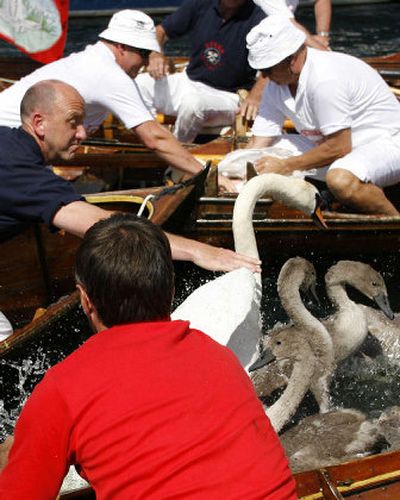Swan Upping a rite of summer on Thames

SHEPPERTON, England – “All up!” goes a cry, and the scarlet-clad boatmen close in on a family of swans.
Two white adults and their brood of fluffy gray cygnets struggle in vain as they are grabbed, trussed and grappled to shore. They don’t know it, but they are part of a centuries-old royal tradition.
Monday saw the start of Swan Upping, a five-day annual census of River Thames swans that mixes science and ceremony.
Since the 12th century – when the graceful birds were served as a delicacy at royal feasts – the monarch has had ownership rights over all mute swans on British waterways.
“In reality, these days we only claim swans on the River Thames,” said David Barber, who bears a scarlet tunic, a captain’s hat crowned with a white feather and the splendid title of Queen’s Swan Marker.
The purpose of the census has changed as well. Once, it was used to identify food. Now, Barber says, “it is a conservation and education exercise.”
It retains its royal pomp and pageantry, however. On the third week of July, Barber leads a team of boatmen up the river in traditional open skiffs flying royal flags and standards. Clad in white trousers and red jerseys marked with the insignia of Queen Elizabeth II, they are called swan uppers. The reason, Barber explained, is rather prosaic.
“Swan upping is the method of going up the river and upping the swans from the water,” he said.
The royal uppers are accompanied by boats representing the Worshipful Company of Vintners and the Worshipful Company of Dyers, ancient London trade guilds granted ownership of some Thames swans in the 15th century. The reasons for this have been lost, as the records were destroyed in the 1666 Great Fire of London.
They are searching for cygnets, young swans born in the spring. When a brood is spotted, boatmen yell “all up,” and the boats close in.
Under the supervision of Christopher Perrins, an Oxford University ornithologist and the queen’s official swan warden, the young birds are tied by the legs and wrestled into boats or onto shore. There they are weighed, their heads measured from back to beak, and their ankles tagged with an identifying number.
Within minutes they are back in the water, flustered but unhurt.
Barber says the census is key to monitoring the health of the swan population. In the 1980s, swan uppers noticed a sharp decline in numbers. The culprit was identified as lead fishing weights, which were poisoning the birds. They were banned and the population rebounded.
Veteran uppers have noticed changes in the river over the years.
“It’s a hell of a lot cleaner, for one thing,” said Alex Collins, who has been taking part for 37 years. He has seen the decline of commercial traffic on the Thames and an increasing number of pleasure craft. Fish are returning in large numbers and the swan population has grown.
But Thames swans still face a hazardous life. Barber says 40 percent of cygnets are killed by fishing lines and tackle. Others fall prey to foxes, pike or dogs.
There are fears that bird flu brought by migrating birds – which Britain has so far escaped – could devastate the population.
Barber says there are about 1,200 to 1,500 adult swans on the river.
“It’s not a disaster, by any means,” he said. “But the population is no bigger than it was in the 1950s.”
A regatta atmosphere prevailed Monday as the flotilla of small boats made its way along the river from Sunbury, on the fringe of London, to Abingdon, 80 miles upstream. Small crowds gathered along the banks and at locks to wave and snap photographs.
When the boats pass the royal residence at Windsor Castle, the uppers stand and hold their oars aloft in a salute to “Her Majesty the Queen, Seigneur of the Swans.”
All have more mundane day jobs on the river; Collins works on garbage boats taking London’s rubbish to landfill sites downriver.
Many, like him, have been taking part in swan upping for years, putting in a week of hard work for what Collins terms “very minimal” pay.
Collins is 64 and will have to retire next year. But he is happy his two sons will carry on the tradition.
“I’ve been able to bring my two boys along, and they’re working now,” he said.
“It’s an honor. You’re asked to come up here, and it’s a nice thing to do.”